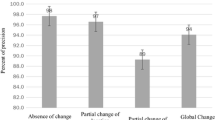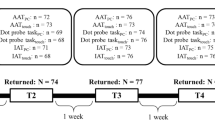Abstract
Three studies investigated the psychometric properties of the complex postformal thought (PFT) questionnaire (Sinnott, unpublished scale, 1998; Sinnott and Johnson 1997), which is a measure of adult cognitive development. The scale was found to be moderately reliable (α = .63). To assess construct validity, a comparison of participants’ performance on the PFT scale to their performance on the Need for Cognition scale was conducted, which indicated the PFT scale is valid measure of complex thought. Factor analysis reduced the scale to three factors, which correspond to important components of PFT: Multiple Elements, Subjective Choice, and Underlying Complexities. Implications for understanding the nature of adult cognitive development and the usefulness of this new measure for research in this area are discussed.
Similar content being viewed by others
References
American Psychological Association. (2002). Ethical principles of psychologists and code of conduct. American Psychologist, 57(12), 1060–1073.
Andrews, G., & Halford, G. S. (2002). A cognitive complexity metric applied to cognitive development. Cognitive Psychology, 45, 153–219.
Bidell, T. R., & Fisher, K. W. (1992). Beyond the stage debate: Action, structure, and variability in Piagetian theory and research. In R. J. Sternberg & C. A. Berg (Eds.), Intellectual development. New York, NY: Cambridge University Press.
Bigler, R. S., & Liben, L. (1992). Cognitive mechanisms in children’s gender stereotyping: Theoretical and educational implications of a cognitive-based intervention. Child Development, 63, 1351–1363.
Blackburn, J. A., & Papalia, D. E. (1992). The study of adult cognition from a Piagetian perspective. In R. J. Sternberg & C. A. Berg (Eds.), Intellectual development. New York, NY: Cambridge University Press.
Cacioppo, J. T., & Petty, R. E. (1982). The need for cognition scale. Journal of Personality and Social Psychology, 42, 116–131.
Cacioppo, J. T., Petty, R. E., Feinstein, J. A., & Jarvis, W. B. G. (1996). Dispositional differences in cognitive motivation: The life and times of individuals varying in need for cognition. Psychological Bulletin, 119, 197–253.
Cacioppo, J. T., Petty, R. E., & Kao, C. F. (1984). The efficient assessment of need for cognition. Journal of Personality Assessment, 48, 306–307.
Cartwright, K. B. (2002). Cognitive development and reading: The relation of multiple classification skill to reading comprehension in elementary school children. Journal of Educational Psychology, 94, 56–63.
Case, R. (1992). Neo-Piagetian theories of child development. In R. J. Sternberg & C. A. Berg (Eds.), Intellectual development (Chap. 6) (pp. 161–196). New York, NY: Cambridge University Press.
Case, R., & Okamoto, Y. (1996). The role of central conceptual structures in the development of children’s thought. Monographs of the Society for Research in Child Development, 61(1–2, Serial No. 246).
Harper Collins Webster’s dictionary (2002/2003). New York: Harper Collins Publishers.
Karmiloff-Smith, A. (1991). Innate constraints and developmental change. In S. Carey & R. Gelman (Eds.), The epigenesis of mind: Essays on biology and cognition (pp. 171–197). Hillsdale, NJ: Lawrence Erlbaum Associates.
Kuhn, D., & Pease, M. (2006). Do children and adults learn differently? Journal of Cognition and Development, 7, 279–293.
Labouvie-Vief, G. (1990). Modes of knowledge and the organization of development. In M. L. Commons, C. Armon, L. Kohlberg, F. A. Richards, T. A. Grotzer, & J. D. Sinnott (Eds.), Adult development, Vol. 2: Models and methods in the study of adolescent and adult thought (Chap. 3) (pp. 43–62). New York: Praeger.
Labouvie-Vief, G. (1992). A neo-Piagetian perspective on adult cognitive development. In R. J. Sternberg & C. A. Berg (Eds.), Intellectual development. New York, NY: Cambridge University Press.
Luna, B., Garver, K. E., Urban, T. A., Lazar, N. A., & Sweeney, J. A. (2004). Maturation of cognitive processes from late childhood to adulthood. Child Development, 75, 1357–1372.
Piaget, J. (1972). Intellectual evolution from adolescence to adulthood. Human Development, 15, 1–12.
Piaget, J., & Inhelder, B. (1969). The psychology of the child (Helen Weaver, Trans.). New York: Basic Books. (Original work published 1966).
Sinnott, J. D. (1984). Postformal reasoning: The relativistic stage. In M. Commons, F. Richards, & C. Armon (Eds.), Beyond formal operations (pp. 298–325). New York: Praeger.
Sinnott, J. D. (1998). The development of logic in adulthood: Postformal thought and its applications. New York: Plenum Press.
Sinnott, J. D. (2008). Cognitive and representational development in adults. In K. B. Cartwright (Ed.), Literacy processes: Cognitive flexibility in learning and teaching. NY: Guilford Press.
Sinnott, J. D., & Johnson, L. (1997). Brief report: Complex postformal thought in skilled research administrators. Journal of Adult Development, 4(1), 45–53.
Tanaka, J. S., Panter, A. T., & Winborne, W. C. (1988). Dimensions of the need for cognition: Subscales and gender differences. Multivariate Behavioral Research, 23, 35–50.
Author information
Authors and Affiliations
Corresponding author
Rights and permissions
About this article
Cite this article
Cartwright, K.B., Galupo, M.P., Tyree, S.D. et al. Reliability and Validity of the Complex Postformal Thought Questionnaire: Assessing Adults’ Cognitive Development. J Adult Dev 16, 183–189 (2009). https://doi.org/10.1007/s10804-009-9055-1
Published:
Issue Date:
DOI: https://doi.org/10.1007/s10804-009-9055-1




